Reflecting on the webinar “Youth Advocates Against Female Genital Cutting – A Conversation on Change”
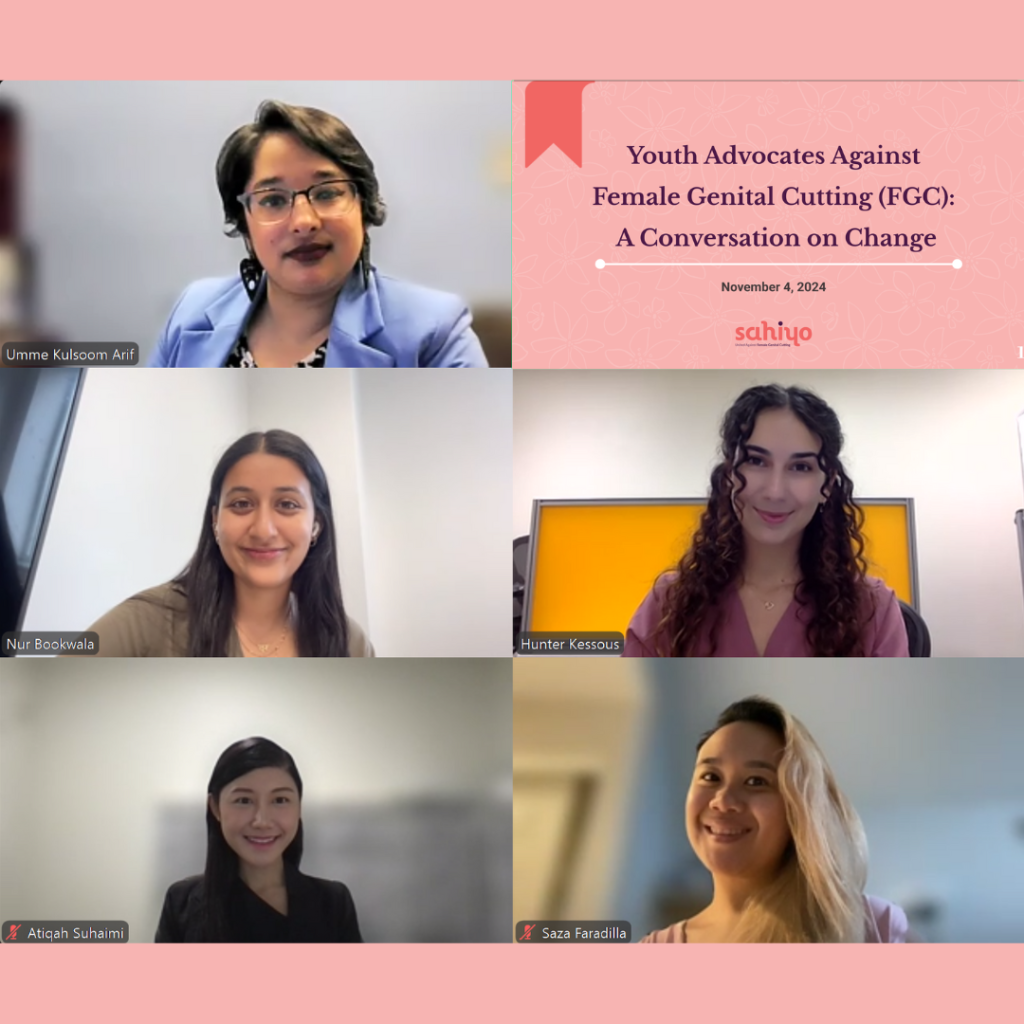
On November 4, Sahiyo U.S. hosted a vibrant webinar titled: Youth Advocacy Against Female Genital Cutting (FGC): A Conversation on Change, where a global community of advocates, educators, medical professionals, and human rights advocates gathered to share experiences and strategies for change. The diversity of perspectives in attendance highlighted how broad the movement to end FGC is. We heard from students who are passionate about women’s health, professors seeking to educate themselves on FGC, and activists working directly in their communities to end this harmful practice. Attendees gathered from near and far, with some folks tuning in from the city of Chicago and others from Singapore! Panelists at the event shared how youth are uniquely positioned to challenge entrenched norms and misconceptions around FGC. One advocate emphasized the importance of research and access to resources in academic institutions. Another spoke on the power of intergenerational engagement, highlighting how each generation brings unique strengths to the movement. Addressing the diverse cultural landscape, a third panelist discussed the significance of incremental progress in regions where FGC is deeply rooted in community social norms, stressing that every step forward, no matter how small, contributes to broader change. As one attendee described, the stories that were shared among the group were “beautiful, heartbreaking, and powerful,” while others thanked the panelists for their “bravery in turning betrayal into action.” For those who couldn’t join, here is a link to the recording of the webinar. We encourage you to watch and reflect on this incredible event alongside us!
Reflecting on the “Female Genital Mutilation/Cutting in California – Past, Present, and Future” Webinar
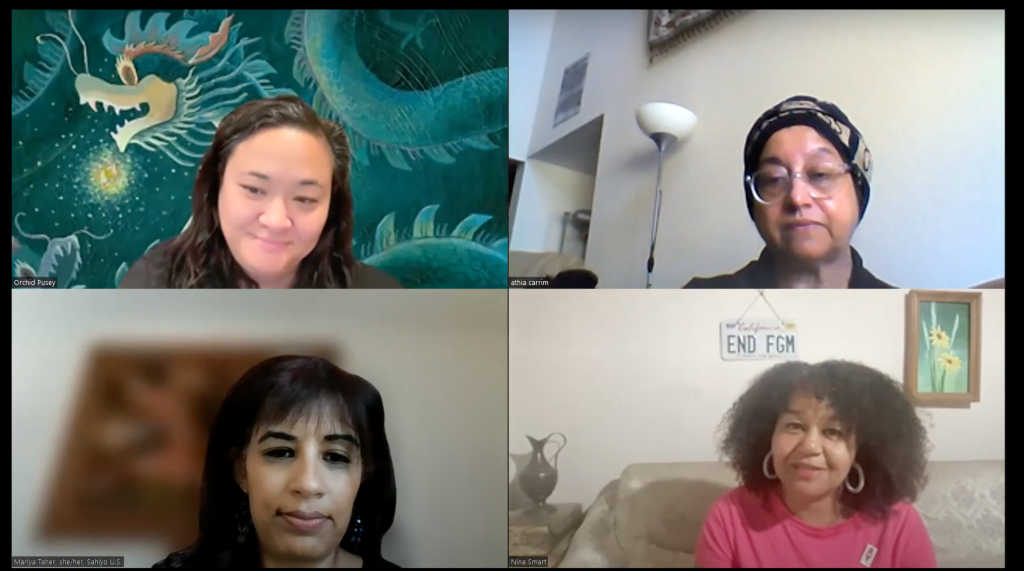
On October 11, Sahiyo in partnership with Equality Now, The U.S. End FGM/C Network, and the Greater Los Angeles FGM Taskforce held a joint webinar titled, “Female Genital Mutilation/Cutting in California – Past, Present, and Future.” The event was moderated by Sahiyo U.S. Executive Director, Mariya Taher and Shivagi Misra of Equality Now. The event brought together a panel of survivors, advocates, service providers, and community members who are already working on ending FGM/C in the state: Dr. Nina Smart and Athia Carrim of the Greater LA FGM Task Force, as well as Orchid Pusey of the San Francisco Asian Women’s Shelter. The speakers shared their histories of working in California, and in some cases globally, to raise awareness about the prevalence of FGC in the state. The conversation then turned to how the state could support advocates’ work by strengthening the current California FGC law, passed in 1996, to include components such as community education, cultural competence in care for survivors, and productive interactions with community members from practicing communities. As Shivangi Misra said during the event, “We can use the law for support, outreach, and healthcare.” The panel also highlighted the intersections of identities that survivors of FGC (for example, recognizing that an FGM/C survivor can also identify as gender-queer). This helps us recognize the need to push for a holistic approach to address survivors of FGM/C. The audience was very engaged, with many participants expressing their eagerness to dive deeper into the topic and sharing their personal experiences working with the issue in the state. We encourage you to watch the full webinar to hear more about the experiences of survivors and advocates, as well as learn what needs to be done while pushing for an updated law in California. [youtube url=”https://www.youtube.com/watch?v=HTAZ0vrd0cg”]
Join Us for an Inspiring Webinar: Youth Advocates Against Female Genital Cutting – A Conversation on Change

We are excited to announce an upcoming webinar that promises to be both enlightening and empowering: Youth Advocates Against Female Genital Cutting – A Conversation on Change. You, too, can join us for this important discussion. Date: November 4, 2024 Time: 12:30 pm ET / 9:30 pm PT Registration Link: https://bit.ly/FGCYouthAdvocacy Why This Webinar Matters This webinar recognizes the vital role of youth advocacy in addressing the practice of female genital cutting (FGC). Recent articles and studies have highlighted the significant impact of youth advocacy in working to end FGC. For instance, an article by Orchid Project reflects on International Youth Day and emphasizes how young advocates have pioneered innovative strategies to raise the awareness of FGC and enhance their advocacy skills. Similarly, organizations like Equality Now exemplify the transformative power of youth-led initiatives, emphasizing the commitment of young advocates to further challenge societal norms and promote an inclusive dialogue on critical issues. Despite efforts to end the practice, FGC still persists as a serious issue affecting millions of people worldwide. Engaging with youth advocates is crucial as they bring fresh perspectives and unwavering passion to challenge norms and drive change for the future. Our Motivation The decision to focus this webinar on youth-led efforts stems from a recognition that young voices are often underrepresented in discussions about FGC. We see this as a missed opportunity. Youth advocates bring a unique energy and perspective that are essential to challenging long-standing norms and practices, and their involvement can drive innovation and lasting change Here’s why we are particularly focused on supporting youth in the work to prevent FGC: Youth as Catalysts for Change: Young people possess a powerful mix of passion, creativity, and determination. They have the potential to challenge outdated practices and create meaningful change. By providing them with the opportunity to share their voices, we can channel their energy into addressing FGC more effectively. Education and Empowerment: Knowledge and confidence are the cornerstones of effective advocacy. This webinar aims to empower young activists by offering insights from experienced advocates who have a thorough understanding of the challenges and opportunities in the movement to end FGC. Event Highlights During this dynamic panel discussion, you will hear from youth advocates who are making a difference in their communities and beyond. They will share their journeys, innovative strategies, and the challenges they have encountered in their advocacy efforts. The session will also include interactive discussions that promote diverse perspectives and collaborative problem-solving. Why You Should Attend This webinar is more than just a conversation—it’s a call to action. By participating, you will: Empower Youth Advocates: Provide a space for young advocates to share experiences and personal strategies for raising awareness and creating change Promote Dialogue: Foster empathy, exchange diverse perspectives and generate innovative ideas for advocacy and community engagement, emphasizing the role of youth in advocacy efforts Build a Stronger Network: This webinar will offer valuable networking opportunities, connecting participants with like-minded individuals, organizations, and experts dedicated to ending FGC. Gain Valuable Insights into Effective Advocacy: You’ll learn from accomplished young activists like Hunter Kessous, Nur Bookwala, Saza Faradilla, Atiqah Suhaimi, and Umme Kulsoom- Arif. Register Now Don’t miss this chance to be part of a transformative dialogue and support the global movement against FGC. Click here to register and secure your spot in this essential discussion.
FGM/C in California – Past, Present, and Future

The California Coalition to End FGM/C is hosting a webinar titled, “FGM/C In California – Past, Present, and Future” Date: Friday, October 11th Time: 12:30 – 1:45 pm ET / 9:30 – 10:45 am PT Registration: https://bit.ly/CAcoalitionwebinar Zoom: https://us02web.zoom.us/j/89895243890?pwd=Y6iLxQmEV1OHv77XbSa8XbrSvbgvYa.1 Description: The webinar will be held like a town hall, giving participants the chance to learn in a safe space about the topic of female genital mutilation (FGM/C) through an interactive dialogue. Speakers will include Sahiyo U.S. Executive Director Mariya Taher; Shivangi Mirsa of Equality Now; Senait Admassu and Athia Carrim of the Greater LA FGM Task Force and African Coalition; and Orchid Pusey of the San Francisco Asian Women’s Shelter. Participants will discuss the shortcomings of the current law in California, which was written back in 1996. The coalition will also lay out how the legislation needs to be amended in order to create culturally sensitive and cognizant prevention and support programs to support survivors and those at risk of FGM/C. This Roundtable is an opportunity to share and learn from survivors, advocates, service providers, and community members on the topic of FGM/C and the work being done to address the issue. Furthermore, this event will seek to connect with California legislators who are accountable for upholding and addressing various components of the original 1996 FGM/C law. Through engaging narratives and open conversation, this webinar will help to garner support in building a greater California coalition to end FGM/C that can better advocate for strengthening existing laws on FGM/C in the State. Register for the webinar here. [youtube url=”https://www.youtube.com/watch?v=HTAZ0vrd0cg”]
Takeaways from Sahiyo’s Webinar on Framing FGM/C
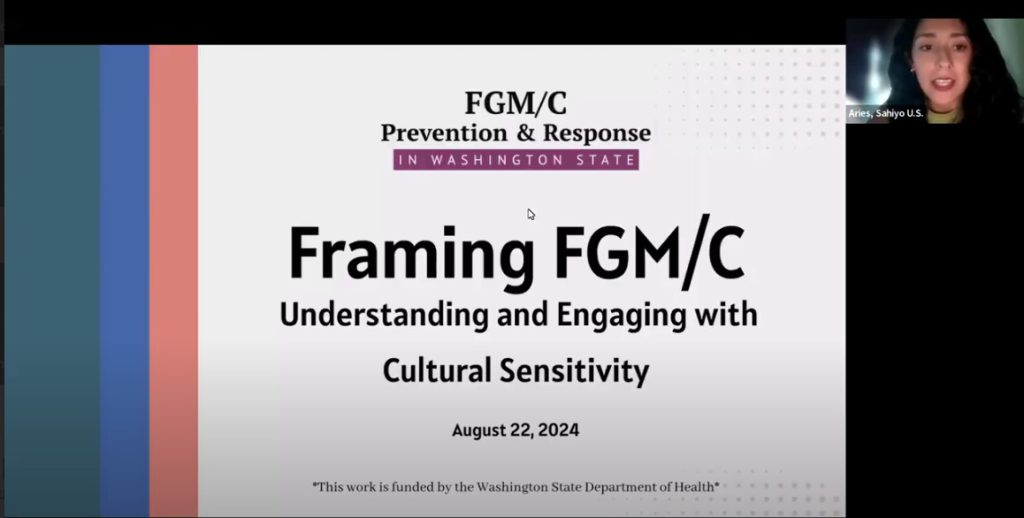
Sahiyo’s recent webinar, “Framing FGM/C: Understanding and Engaging with Cultural Sensitivity,” left a lasting impression on many of the attendees. With over 160 registrants, the session successfully opened up important conversations on how framing can shape our approach to ending female genital cutting (FGC). Feedback from participants shared after the event shed light on how this training has influenced their perspectives and engagement. One of the key takeaways from the webinar was how critical it is to frame discussions around FGM/C in a way that respects cultural contexts while still advocating for change. As one participant shared: “It has opened my eyes to an ongoing issue that I hadn’t been fully aware of before. I plan on using the communication skills presented in this slideshow for organizing and discussing issues.” Throughout the session, participants shared their thoughts and experiences, many remarking on how the personal stories shared deeply moved them. Digital stories shown from the Voices to End FGM/C project sparked meaningful reflections on how the way we talk about FGM/C impacts both the movement and those affected: “Seeing Renee’s story really impacted me and demonstrated the importance of awareness of this world issue.” “Hearing stories always motivates me towards advocacy – the courage is contagious.” This training was funded by the Washington State Department of Health and held in partnerships with the U.S. Network to End FGM/C. Visit the Washington state project website to learn more and watch Renee’s story below! [youtube url=https://www.youtube.com/watch?v=UlO-_WRWZoU]
“Four Essential Strategies for Self and Community Care in Activism” Event with Farzana Doctor on September 10th
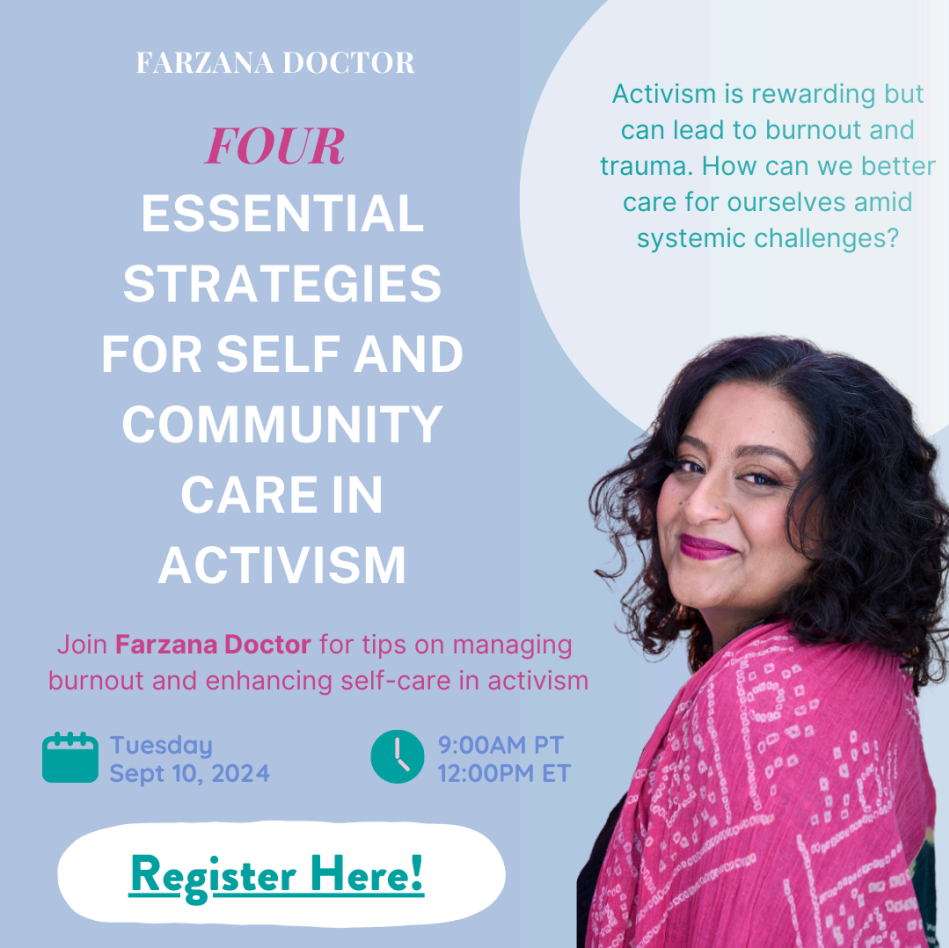
Sahiyo U.S. and the U.S.End FGM/C Network invite you to join our upcoming event, “4 Essential Strategies for Self and Community Care in Activism.” This event is free to attend, but we invite you to make a meaningful contribution to support the FGM/C Policy Advocate Care Fund today. Date: Tuesday, September 10, 2024 Time: 9-10 am PT / 12-1 pm ET Platform: Virtual – Zoom Registration Link: bit.ly/CareForActivists Description: Farzana Doctor, an activist, social worker, Sahiyo blog contributor, and author, will share practical strategies to help reduce stress, fatigue, and vicarious trauma, offering actionable ideas to bring more self and community care into the lives and work of those working for social change. While activism is incredibly rewarding, it can also be demanding and overwhelming. The dedication to addressing global injustices can often lead to burnout, vicarious trauma, and self-doubt. Many of these problems arise due to systemic issues, such as underfunding in the activism sector, oppression, and ongoing global crises. This event aims to equip individuals with tools to prioritize their well-being while doing the invaluable work of supporting and protecting people and communities. Don’t miss this important opportunity to learn and engage in a conversation about sustaining activism while maintaining your well-being. About the FGM/C Policy Advocate Care Fund: We’re excited to announce this event is being held to also support the newly established FGM/C Policy Advocate Care Fund, a joint initiative by Sahiyo U.S. and the U.S. End FGM/C Network. This fund is dedicated to empowering advocates and survivors who work relentlessly to address FGM/C in their communities to gain the resources and support they need to actively engage in education and policy advocacy. Our goal is to ensure these advocates are fairly compensated and honored for their invaluable contributions, addressing the gaps in funding and acknowledgment they too often face. Support FGM/C Policy Advocates! Donate today!
Impactful Media Reporting on Female Genital Mutilation/Cutting in the United States: A Reflection on our April 17, 2024 Webinar
By Megan Seaver On April 17th, Sahiyo U.S and Equality Now had the honor of hosting a virtual event, “Impactful Media Reporting on Female Genital Mutilation/Cutting in the United States: A Conversation.” This webinar explored how to report on female genital mutilation/cutting (FGM/C) in a culturally cognizant, gender-sensitive, and ethical way. Attendees were media and communications professionals. Speakers included a panel of media and advocacy experts, such as: Washington State Senator Karen Kaiser, Emma Batha of Thomson Reuters Foundation News, Journalist Milena Mikael Debass, and documentary filmmaker Milena Warns from Without Exception Films. The moderators were Sahiyo Co-founder and U.S. Executive Director, Mariya Taher, and Equality Now Communications Officer for North America, Mel Bailey. Through this conversation, attendees were better able to understand the prevalence and complexity of FGM/C within the U.S. and the importance of engaging with survivors in a considerate manner when reporting on FGM/C. Additionally, attendees gained strategies on how to use media platforms to raise awareness and educate the public on FGM/C. They also learned analytical tools for covering related news, such as legal developments and community advocacy efforts effectively. Here are some highlights from webinar attendees: The importance of building relationships with survivors: “I can’t stress enough how important it is to build those contacts with survivors because that is how you get stories. When I meet advocates, or survivors I like to spend quite a lot of time with them, and meet them in person, because even if that interaction does not lead to a story you’re still increasing your knowledge which makes for better reporting and also builds trust so that the survivor or organization better understands what you as the report are seeking from the interaction” – Emma Batha The impact of a comprehensive approach and the role the media plays in it: “We are here to talk about media in all its forms and the roles that media can play when it comes to having a multi-sectoral approach to end FGM/C. Multi-sectoral means the collective effort of government agencies [and] local organizations, provides FGM/C education builds awareness, as well as support services for survivors at the federal, state, and local levels, to end FGM/C.” – Mariya Taher How media can tackle misinformation: “It takes a lot of education, and the media is a part of that process because people have a lot of misinformation. Unfortunately, we had to clarify that this practice is not religious practice… so it was somewhat of a difficult communications project and I have to give credit to the Washington coalition for providing first-person testimony to correct, and educate and to elucidate this issue.” – Senator Karen Kaiser On Survivor-led initiatives: “I wanted to write something that highlighted survivor-lead efforts to end the practice in the U.S. Figuring out how to show that work through videos took time, to build relationships, and how to make it visual. I had several conversations with Mariya, always kind of thinking about what types of work I could highlight. By the end, I was able to interview three survivor activists, but also film the Activist Retreat which is put on by Sahiyo in New York, [as well as help a D.C.survivors support group for African women, and a training for law enforcement on how to look for signs of FGM/C taking place in their community.” – Milena Mikael Debass Bring the issue of FGM/C to a wider audience: “We have a docu-series that focuses on different issues women face around the world and FGM/C is one of those. The one thing I keep coming back to is that we don’t give people enough credit. People want to learn about this, myself included. When we were going to film in different parts of the world, I spoke to my friends about this project and they wanted to know more about it. Then when we included the celebrity component we interviewed Constance Wu, an actress in Crazy Rich Asians who personally chose to discuss this topic because she personally wanted to learn about it.” – Milena Warns To learn more about this event, watch the recording below: [youtube url=”https://www.youtube.com/watch?v=oJsW0Ll024I”] Learn more about media communication/reporting on FGM/C with the resources below: Sahiyo survivor stories – Sahiyo Resource Guide for Sensitive and Effective Reporting on FGM/C – Sahiyo Global FGM media reporting toolkit – Equality Now US FGM media factsheet – Equality Now US FGM State Law Map – Equality Now
Reflecting on our webinar: Quiet Activism and Understanding the Psychosocial Impacts of Female Genital Cutting

On April 25th, our Sahiyo community came together for a deeply engaging webinar, joined by participants from across the globe including the United Arab Emirates, Nepal, Switzerland, Myanmar, and India. The event, titled “Quiet Activism and Understanding the Psychosocial Impacts of Female Genital Cutting,” brought together a panel of inspiring speakers: Arefa Cassoobhoy, Farrah Dalal, Doris Mukangu, and Lubaina Plumber. Each shared their personal stories of activism and reflected on how their work has evolved during different stages of their lives. Our speakers opened up about their unique journeys, discussing the “quiet” or private forms of activism that shape their day-to-day lives. They discussed navigating complex psychosocial contexts—ranging from family dynamics to community backlash—and shared valuable insights on the feeling of burnout and fatigue as well as the importance of fostering allyship while prioritizing mental health and wellbeing. We encourage you to watch the full webinar to hear more about their experiences with initiating sensitive conversations within tight-knit communities and leveraging personal stories to foster understanding and empathy. The warmth and engagement from our audience were palpable, with many expressing their eagerness to dive deeper into the topics of quiet activism and the sense of solidarity, resonating deeply with the speakers. One attendee captured the sentiment beautifully, saying, “I am in awe of you young ladies. I applaud you all for the steps you have taken and how you have dealt with your experiences. Keep up your great work and what you are doing. My heart is with you.” This event reminds us of the power of community and the impact of every thoughtful action in our shared cause.
Critical Intersections of FGM/C: The Value of Intersectionality in Cross-Collaboration Webinar
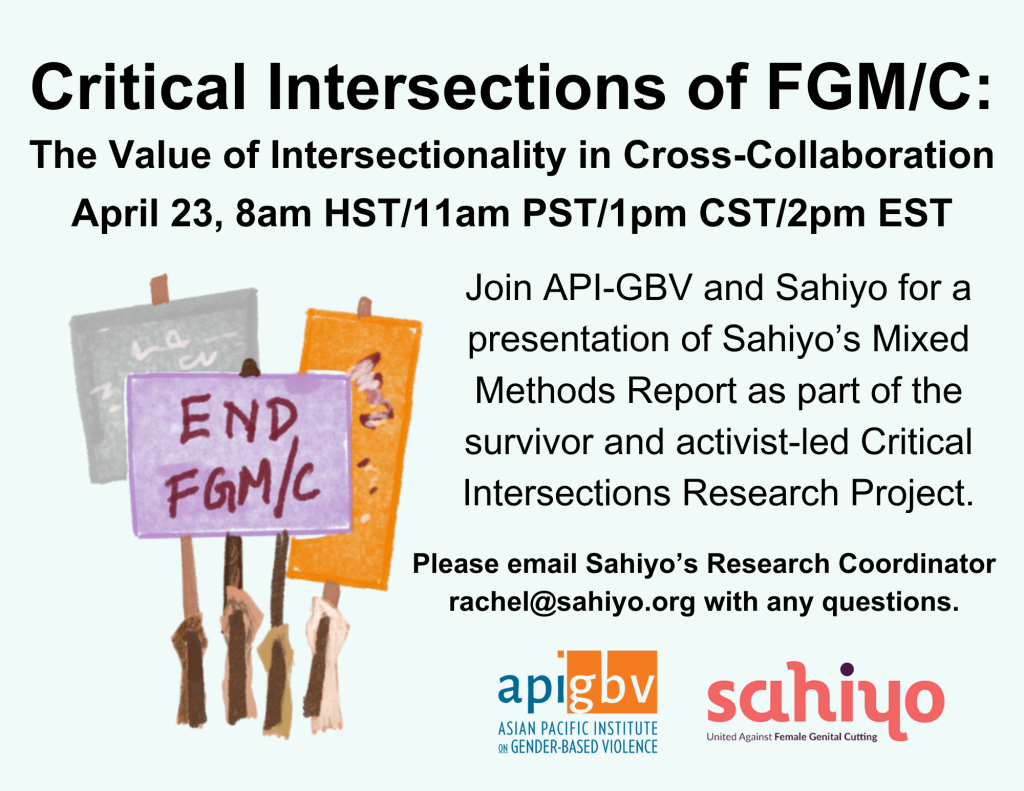
Sahiyo is excited to announce an upcoming event tied to our survivor and advocate-led Critical Intersections Research Project! This original research, which has been in development for over two years, examines the issue of female genital mutilation/cutting (FGM/C) through an intersectional lens. This includes an analysis of media on the topic (published in our first report), as well as data from a mixed-methods survey (published in our second report) and in-depth qualitative interviews (to be published later in 2024). The project seeks to understand both challenges that FGM/C survivors and activists face, as well as opportunities for cross-sector collaboration with other social justice movements. Critical Intersections of FGM/C: The Value of Intersectionality in Cross-Collaboration, hosted by API-GBV, will focus on collaborative aspects of social justice work. In hopes of facilitating meaningful discussion around cross-sector collaboration and intersectional programming, this presentation shares challenges and opportunities to collaborative projects found in our research, with plenty of time for feedback and weigh in from the audience. Because turning data into action is the goal, and Sahiyo continues its exploration on this topic, we hope to expand our understanding with the insights of activists, frontline professionals, and other attendees of this event. Event Date: April 23rd Event Time: 2:00-3:30 PM EST Registration: https://us02web.zoom.us/meeting/register/tZModOypqT0qG9BpxXwUcL_lIiFmUOSP_l49#/registration
Presenting “Quiet Activism and the Psychosocial Impacts of Female Genital Cutting”
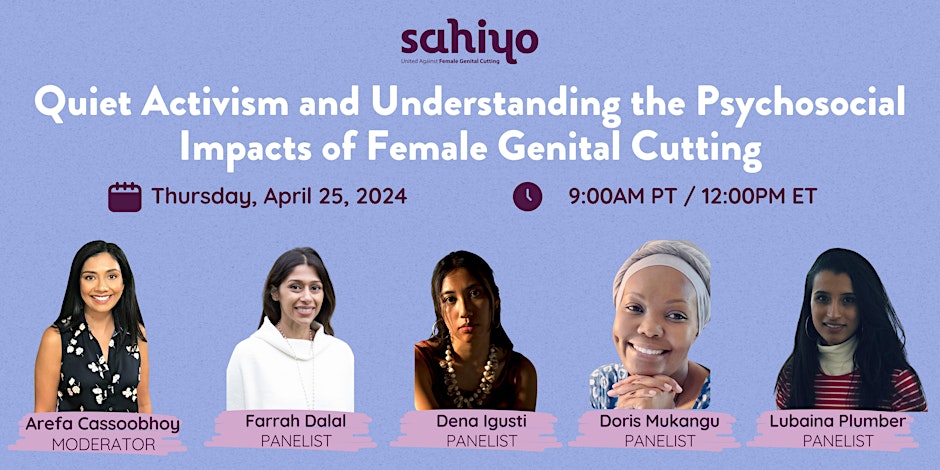
Event Overview Join us on April 25, 2024, at 12 PM EST for an enlightening webinar titled “Quiet Activism and the Psychosocial Impacts of Female Genital Cutting.” We are honored to feature speakers Arefa Cassoobhoy, Doris Mukangu, Farrah Dalal, Dena Igusti, and Lubaina Plumber, who will share their insights on leveraging quiet activism to navigate and transform the psychosocial landscape of FGC. During this webinar, you will be able to participate in a discussion about the diverse experiences of navigating the psychosocial landscape of FGC and advocacy work. Through shared stories and discussions, we aspire to showcase the transformative power of quiet activism. We’ve seen firsthand the profound impact of taking a personal stand, and we hope to empower attendees to appreciate the significance of their contributions to the movement against FGC. This webinar is an open invitation to anyone interested in understanding the broader impacts of FGC and the role of activism in driving change. Whether you are a survivor, activist, or someone interested in learning more about FGM/C, your presence will enrich the conversation. Register Today! A note from Sophia Jones, Sahiyo Events and Programs Intern When discussing the implications and outcomes of Female Genital Cutting (FGC) there is often an emphasis on the physical outcomes. However, the implications of FGC are wide and varied. Experiences of “othering,” emotional suppression, and the development of psychiatric disorders such as depression, anxiety, and post-traumatic stress disorder highlight the complex aftermath of FGC. This complexity extends to families who challenge cultural norms by rejecting FGC, facing societal marginalization for their decision. Against this backdrop, we invite you to show solidarity and learn more about “quiet activism”—individual actions that contribute to ending FGC, often without public acknowledgment. This form of activism, embracing everything from personal conversations to advocating within families, or artistic expressions that spark meaningful dialogue, represents powerful acts of change.
